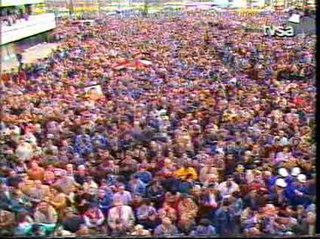 W
WOn 5 April 1992, in response to events all over Bosnia and Herzegovina 100,000 people of all nationalities turned out for a peace rally in Sarajevo. Serb snipers in the iconic Holiday Inn hotel under the control of the Serbian Democratic Party in the heart of Sarajevo opened fire on the crowd killing six people and wounding several more. Suada Dilberović and an ethnic Croat woman Olga Sučić were in the first rows, protesting on the Vrbanja bridge at the time. The bridge on which Sučić and Dilberović were killed was renamed in their honor. Six Serb snipers were arrested, but were exchanged when the Serbs threatened to kill the commandant of the Bosnian police academy who was captured the previous day, after the Serbs took over the academy and arrested him.
 W
WThe Bijeljina massacre involved the killing of between 48 and 78 civilians by Serb paramilitary groups in Bijeljina on 1–2 April 1992 during the Bosnian War. The majority of those killed were Bosniaks. Members of other ethnicities were also killed, such as Serbs deemed disloyal by the local authorities. The killing was committed by a local paramilitary group known as Mirko's Chetniks and by the Serb Volunteer Guard, a Serbia-based paramilitary group led by Željko Ražnatović. The SDG were under the command of the Yugoslav People's Army (JNA), which was controlled by Serbian President Slobodan Milošević.
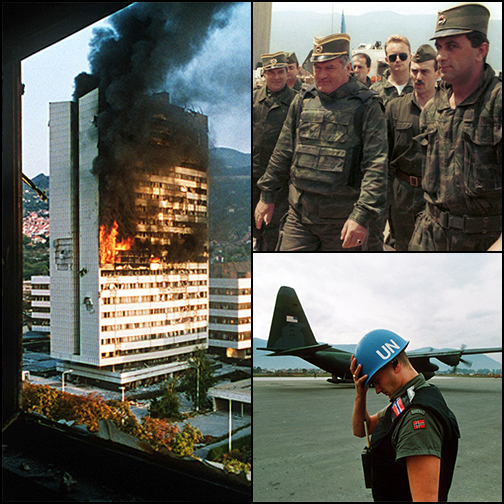 W
WThe Bosnian War was an international armed conflict that took place in Bosnia and Herzegovina between 1992 and 1995. The war is commonly seen as having started on 6 April 1992, following a number of violent incidents earlier in the year. The war ended on 14 December 1995. The main belligerents were the forces of the Republic of Bosnia and Herzegovina and those of Herzeg-Bosnia and Republika Srpska, proto-states led and supplied by Croatia and Serbia, respectively.
 W
WOperation Corridor 92 was the largest operation conducted during the Bosnian War by the Army of Republika Srpska (VRS) against the forces of the Croatian Defence Council (HVO) and the Croatian Army (HV) in the Bosanska Posavina region of northern Bosnia and Herzegovina between 24 June and 6 October 1992. The objective of the offensive was to re-establish a road link between the city of Banja Luka in the west of the country and the eastern parts of the territory controlled by the Bosnian Serbs. The offensive was prompted by the capture of Derventa by the HV and the HVO – a move that blocked the single overland road between the VRS-controlled territories.
 W
WThe Croat–Bosniak War was a conflict between the Republic of Bosnia and Herzegovina and the self-proclaimed Croatian Republic of Herzeg-Bosnia, supported by Croatia, that lasted from 18 October 1992 to 23 February 1994. It is often referred to as a "war within a war" because it was part of the larger Bosnian War. In the beginning, Bosniaks and Croats fought in an alliance against the Yugoslav People's Army (JNA) and the Army of Republika Srpska (VRS). By the end of 1992, however, tensions between Bosniaks and Croats increased. The first armed incidents between them occurred in October 1992 in central Bosnia. Their military alliance held out until early 1993 when their cooperation fell apart and the two former allies engaged in open conflict.
 W
WEthnic cleansing occurred during the Bosnian War (1992–95) as large numbers of Bosnian Muslims (Bosniaks) and Bosnian Croats were forced to flee their homes or were expelled by the Army of Republika Srpska and Serb paramilitaries. Bosniaks and Bosnian Serbs had also been forced to flee or were expelled by Bosnian Croat forces, though on a restricted scale and in lesser numbers. The UN Security Council Final Report (1994) states while Bosniaks also engaged in "grave breaches of the Geneva Conventions and other violations of international humanitarian law", they did not engage in "systematic ethnic cleansing" to the same degree as Bosnian Serb forces. According to the report, "there is no factual basis for arguing that there is a 'moral equivalence' between the warring factions".
 W
WThere was a campaign of ethnic cleansing in the area of the town of Foča committed by Serb military, police, and paramilitary forces on Bosniak civilians from 7 April 1992 to January 1994 during the Bosnian War. By one estimate, around 21,000 non-Serbs left Foča after July 1992.
 W
WThe Bosnian genocide refers to either the Srebrenica massacre or the wider crimes against humanity and ethnic cleansing throughout areas controlled by the Army of Republika Srpska (VRS) during the Bosnian War of 1992–1995. The events in Srebrenica in 1995 included the killing of more than 8,000 Bosniak men and boys, as well as the mass expulsion of another 25,000–30,000 Bosniak civilians by VRS units under the command of General Ratko Mladić.
 W
WThe Glogova massacre was the mass murder of 64 Bosniak civilians by Serb forces, consisting of the Yugoslav People's Army (JNA), Bratunac Territorial Defence (TO), local police, and paramilitaries from Serbia, on 9 May 1992. Miroslav Deronjić, the head of the "Bratunac Municipal Board" established by the Serbian Democratic Party (SDS), was sentenced to 10 years in prison by the International Criminal Tribunal for the former Yugoslavia for ordering the massacre.
 W
WThe Siege of Mostar was fought during the Bosnian War first in 1992 and then again later in 1993 to 1994. Initially lasting between April 1992 and June 1992, it involved the Croatian Defence Council (HVO) and the Army of the Republic of Bosnia and Herzegovina (ARBiH) fighting against the Serb-dominated Yugoslav People's Army (JNA) after Bosnia and Herzegovina declared its independence from Yugoslavia. That phase ended in June 1992 after the success of Operation Jackal, launched by the Croatian Army (HV) and HVO. As a result of the first siege around 90,000 residents of Mostar fled and numerous religious buildings, cultural institutions, and bridges were damaged or destroyed.
 W
WThe Siege of Bihać was a three-year-long siege of the northwestern Bosnian town of Bihać by the Army of the Republika Srpska, the Army of the Republic of Serbian Krajina and Bosniak dissenters led by the Bosniak politician Fikret Abdić during the 1992–95 Bosnian War. The siege lasted for three years, from June 1992 until 4–5 August 1995, when Operation Storm ended it after the Croatian Army (HV) overran the rebel Serbs in Croatia and northwest of the besieged town.
 W
WSilos was a concentration camp operated by the Army of the Republic of Bosnia and Herzegovina (ARBiH) during the Bosnian War. Centered around a windowless grain silo, it was used to detain Bosnian Serb, and to a lesser extent Bosnian Croat, civilians between 1992 and 1996. The camp was located in the village of Tarčin, near the town of Hadžići, 10 kilometres (6.2 mi) west of Sarajevo. Inmates were subjected to beatings, given little food and kept in unsanitary conditions. It had a full capacity of 600; 24 prisoners died or were killed while the camp was operational.
 W
WThe Snagovo massacre refers to the mass killing of 36 Bosnian Muslim civilians by Serbs on 29 April 1992 in the village Snagovo, located in the municipality of Zvornik, Bosnia and Herzegovina. The massacre occurred at the start of the Bosnian War.
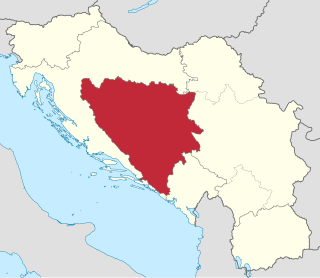 W
WUnited Nations Security Council resolution 752, adopted unanimously on 15 May 1992, after reaffirming resolutions 713 (1991), 721 (1991), 724 (1991), 727 (1992), 740 (1992) 743 (1992) and 749 (1992), the Council expressed concern at the situation in the Yugoslavia, in particular the fighting in Bosnia and Herzegovina, demanding that all parties end the fighting and respect the ceasefire signed on 12 April 1992.
 W
WUnited Nations Security Council resolution 755, adopted without a vote on 20 May 1992, after examining the application of the Republic of Bosnia and Herzegovina for membership in the United Nations, the Council recommended to the General Assembly that Bosnia and Herzegovina be admitted. The recommendation came amid the breakup of Yugoslavia.
 W
WUnited Nations Security Council resolution 757 was adopted on 30 May 1992. After reaffirming resolutions 713 (1991), 721 (1991), 724 (1991), 727 (1992), 740 (1992) 743 (1992), 749 (1992) and 752 (1992), the Council condemned the failure of the authorities in the Federal Republic of Yugoslavia to implement Resolution 752.
 W
WUnited Nations Security Council resolution 758, adopted unanimously on 8 June 1992, after reaffirming resolutions 713 (1991), 721 (1991), 724 (1991), 727 (1992), 740 (1992) 743 (1992), 749 (1992), 752 (1992) and 757 (1992), the Council, in accordance with a report by the Secretary-General Boutros Boutros-Ghali, decided to enlarge the mandate and strength of the United Nations Protection Force (UNPROFOR) in former Yugoslavia.
 W
WUnited Nations Security Council resolution 761, adopted unanimously on 29 June 1992, after reaffirming resolutions 713 (1991), 721 (1991), 724 (1991), 727 (1992), 740 (1992) 743 (1992), 749 (1992), 752 (1992), 757 (1992), 758 (1992) and 760 (1992), the Council authorised the Secretary-General to immediately deploy additional elements of the United Nations Protection Force in Croatia and Bosnia and Herzegovina during the Yugoslav Wars.
 W
WUnited Nations Security Council resolution 762, adopted unanimously on 30 June 1992, after reaffirming resolutions 713 (1991), 721 (1991), 724 (1991), 727 (1992), 740 (1992) 743 (1992), 749 (1992), 752 (1992), 757 (1992), 758 (1992), 760 (1992) and 761 (1992), the Council urged all parties to honour their commitments to the United Nations plan in former Yugoslavia and complete a cessation of hostilities.
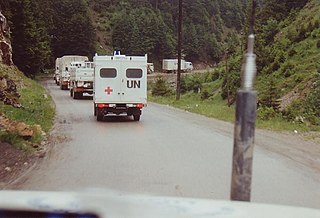 W
WUnited Nations Security Council resolution 764, adopted unanimously on 13 July 1992, after reaffirming previous resolutions on the topic, the Council noted the violations of the agreement concerning Sarajevo International Airport which established a security corridor and demanded withdrawal of anti-aircraft weapon systems, and decided to authorise an additional deployment of United Nations Protection Force personnel. It would increase the size of the Force to two infantry battalions.
 W
WUnited Nations Security Council resolution 769, adopted unanimously on 7 August 1992, after reaffirming Resolution 743 (1992) and all subsequent resolutions relating to the United Nations Protection Force (UNPROFOR), the Council authorised enlargements in the strength and mandate of UNPROFOR to "enable the Force to control the entry of civilians into the United Nations Protected Areas", in addition to performing immigration and customs functions.
 W
WUnited Nations Security Council resolution 770, adopted on 13 August 1992, after reaffirming previous resolutions on the topic, including Resolution 743 (1992), Resolution 749 (1992), Resolution 761 (1992) and Resolution 764 (1992), the Council recognised the humanitarian situation in Sarajevo and other areas in Bosnia and Herzegovina.
 W
WUnited Nations Security Council resolution 771, adopted unanimously on 13 August 1992, after reaffirming resolutions 713 (1991), 721 (1991), 724 (1991), 727 (1992), 740 (1992), 743 (1992), 749 (1992), 752 (1992), 757 (1992), 758 (1992), 760 (1992), 761 (1992), 762 (1992), 764 (1992), 769 (1992) and 770 (1992), the Council expressed concern at and condemned widespread violations of international humanitarian law in the territory of the former Yugoslavia and in particular, Bosnia and Herzegovina.
 W
WUnited Nations Security Council resolution 776, adopted on 14 September 1992, after reaffirming Resolution 743 (1992) and noting offers of assistance made by Member States since the adoption of Resolution 770 (1992), the Council authorised an increase in the size and strength of the United Nations Protection Force in Bosnia and Herzegovina and other areas of the former Yugoslavia.
 W
WUnited Nations Security Council resolution 780, adopted unanimously on 6 October 1992, after reaffirming Resolution 713 (1991) and subsequent resolutions on the topic, the Council expressed its concern at the continued "widespread violations of international humanitarian law" in Bosnia and Herzegovina and authorised the Secretary-General Boutros Boutros-Ghali to establish a Commission of Experts to examine and analyse the information submitted pursuant to Resolution 771 (1992) on violations of the Geneva Conventions in the region.
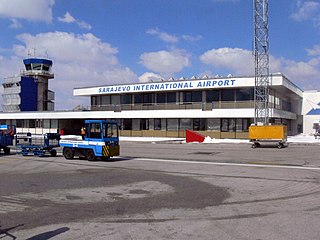 W
WUnited Nations Security Council resolution 781, adopted on 9 October 1992, after reaffirming Resolution 713 (1991) and all subsequent resolutions on the situation in the former Yugoslavia, the Council decided to impose a ban on military flights in the airspace over Bosnia and Herzegovina, acting in accordance with the provisions set out in Resolution 770 (1992).
 W
WUnited Nations Security Council resolution 786, adopted unanimously on 10 November 1992, after reaffirming Resolution 781 (1992), the Council approved a recommendation by the Secretary-General Boutros Boutros-Ghali to increase the strength of the United Nations Protection Force (UNPROFOR) in Bosnia and Herzegovina by 75 observers to monitor the ban on military flights over the country.
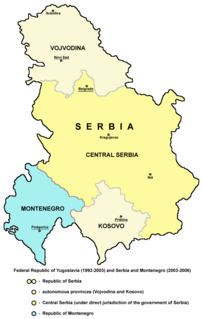 W
WUnited Nations Security Council resolution 787, adopted on 16 November 1992, after reaffirming Resolution 713 (1991) and all subsequent resolutions on the topic, the Council called upon the parties in Bosnia and Herzegovina to consider the draft outline constitution as a basis for negotiating a political settlement of the conflict in the country, and went on to impose further international sanctions on the Federal Republic of Yugoslavia.
 W
WUnited Nations Security Council resolution 795, adopted on 11 December 1992, after expressing concern about possible developments which could undermine confidence and stability in the former Yugoslav Republic of Macedonia and welcoming the Organization for Security and Co-operation in Europe (OSCE) mission in Macedonia, the Council recalled Chapter VIII of the United Nations Charter and authorised the Secretary-General Boutros Boutros-Ghali to deploy a presence of the United Nations Protection Force (UNPROFOR) in the border areas of Macedonia.
 W
WUnited Nations Security Council resolution 798, adopted unanimously on 18 December 1992, after reaffirming 770 (1992) and 771 (1992) and supporting an initiative by the European Council.The Council condemned reports of the massive, organized and systematic detention and rape of women, in particular Muslim women, in Bosnia and Herzegovina during the Bosnian War.
 W
WThe Višegrad massacres were acts of mass murder committed against the Bosniak civilian population of the town and municipality of Višegrad during the ethnic cleansing of eastern Bosnia by Serb police and military forces during the spring and summer of 1992, at the start of the Bosnian War.
 W
WOperation Vrbas '92 was a military offensive undertaken by the Army of Republika Srpska in June–October 1992, during the Bosnian War. The goal of the operation was the destruction of a salient around the central Bosnian town of Jajce, which was held by the Croatian Defence Council and the Army of the Republic of Bosnia and Herzegovina. The intensity of fighting varied considerably and involved several major VRS offensive efforts interspersed by relative lulls in fighting. Jajce fell to the VRS on 29 October 1992, and the town's capture was followed by the destruction of all its mosques and Roman Catholic churches.
 W
WThe Zvornik massacre refers to acts of mass murder and violence committed against Bosniaks and other non-Serb civilians in Zvornik by Serb paramilitary groups at the beginning of the Bosnian War in 1992. It was part of a wider campaign of ethnic cleansing in the Bosnian War: by one estimate, 40,000 Bosniaks were expelled from the Zvornik district.